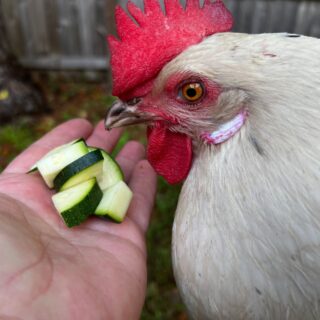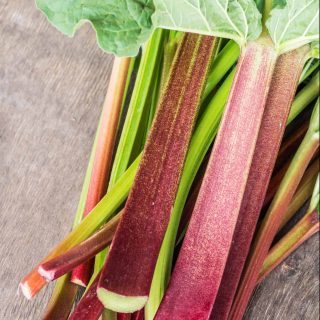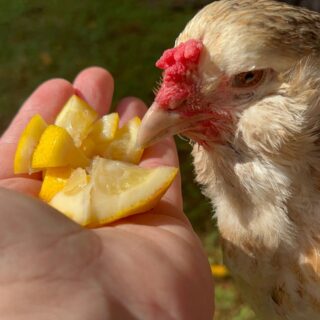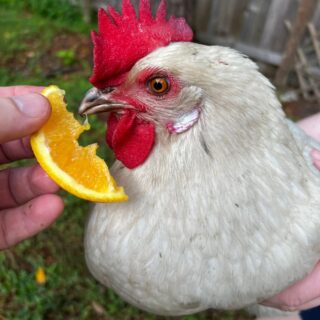Yes, chickens can eat radishes. The whole radish is edible as a healthy treat your chickens will love. You can feed them cooked, raw, leaves or just the flesh.
But before you let your chickens go wild in your garden, make sure you know how to feed radishes and what their benefits are.
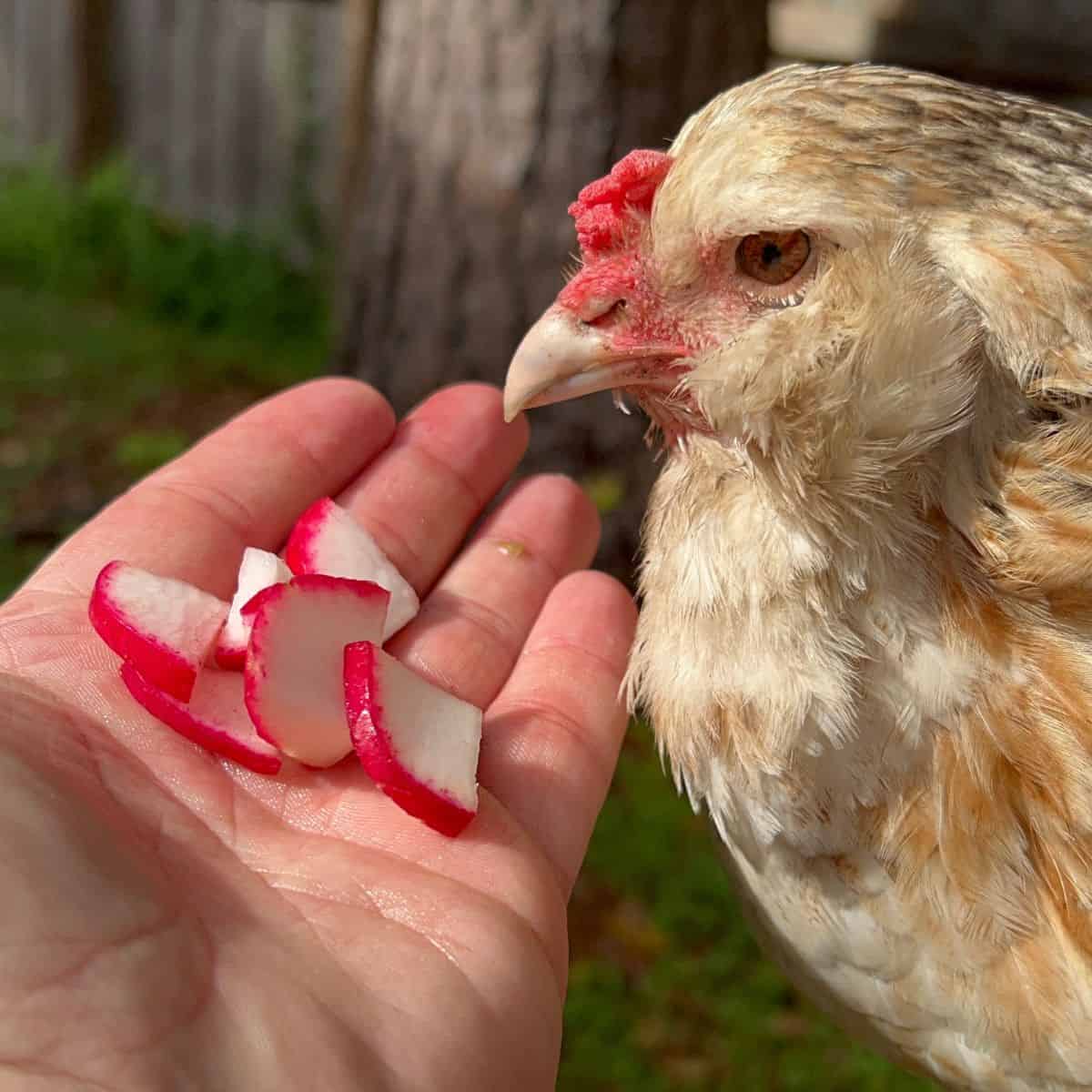
Are Radishes Safe for Chickens?
Yes, radishes are safe for chickens to eat. They do tend to be hard (when served raw). And, because they don't have a super strong smell or sweet taste, sometimes chickens take a while to warm up to them.
But, if you leave them out for your flock, they will go over and explore eventually. Our always end up demolishing them once they get started.
Can chickens eat the radish greens?
Yes, chickens can eat radish greens. They are perfectly safe and healthy to feed to your chickens.
Can Chickens eat radish leaves?
Yep, chickens can certainly also eat radish leaves. Although you may want to keep them away from your radish plants so they don't destroy them all.
Some plants are toxic if the plant is eaten, like when chickens eat tomatoes and green potatoes or can just make them uncomfortable for a while. Or, like when chickens eat mango leaves that contain the same chemicals as poison ivy (although, in some cases they can also cause a severe health problem). Same goes for rhubarb which chickens can eat, but only the stalks because the rest of the plant contains oxalic acid which is poisonous.
Can Chickens eat radish seeds?
Absolutely, chickens can eat radish seeds from their seed pods. However, they're not super tasty or easy to eat, so this is probably not going to be a top choice of treats for your flock.
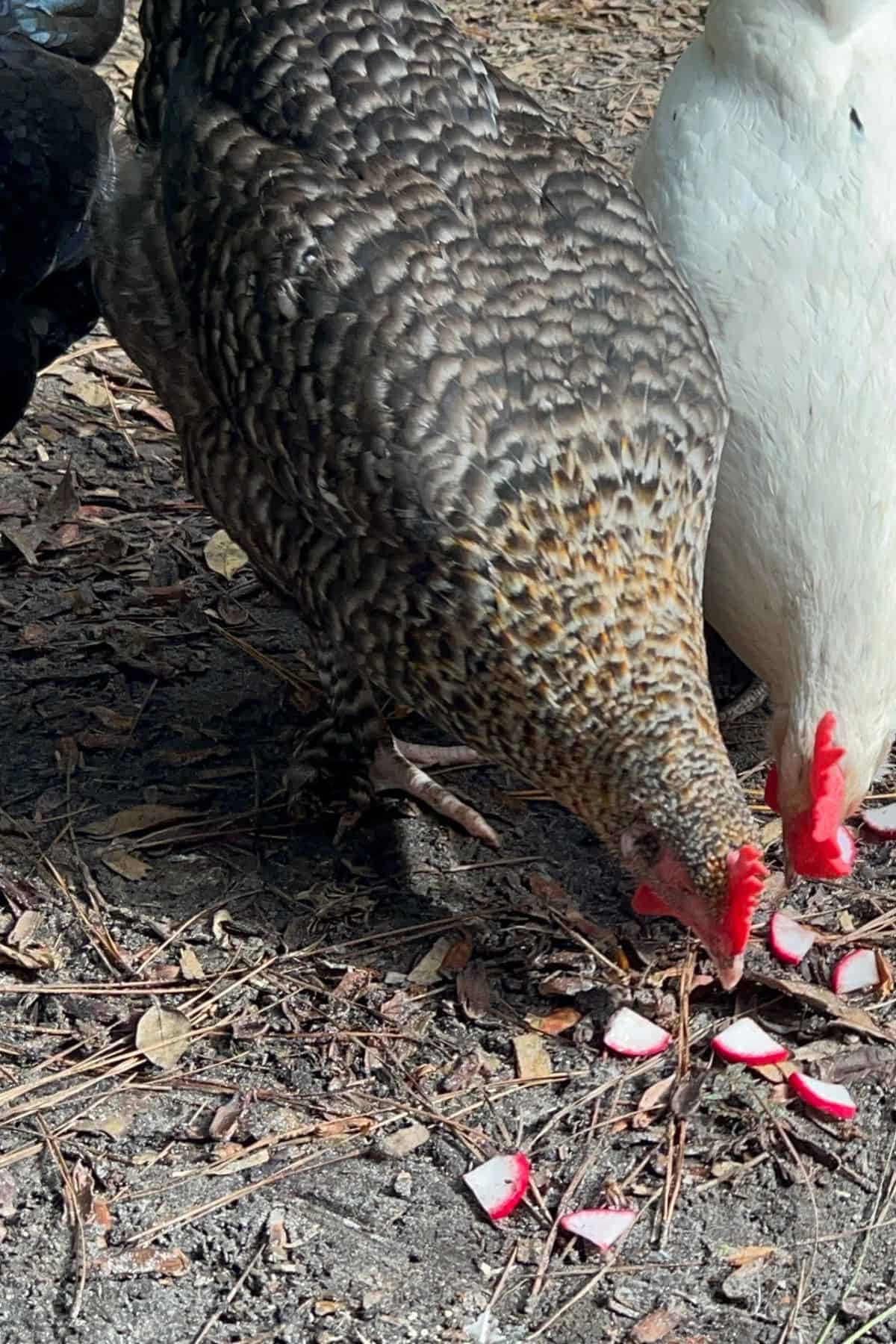
Can chickens eat raw radishes?
Yes, chickens can eat raw radishes. However, raw radishes are rather hard and it may be difficult for them to make much headway with them.
Can chickens eat Radish sprouts?
Yes, chickens can eat radish sprouts - or immature radish plants as they start to grow. It is perfectly safe for them to do so.
However, if you are growing radishes you probably want to keep your chickens away from any sprouts that are coming up because they WILL eat them and destroy your potential garden before it can start.
Can chickens eat cooked radishes?
Yes, chickens can eat cooked radishes. Cooked radishes are the best way to feed radishes to your chickens.
Need some help keeping your chickens health and care taken care of? Check out the Organized Chicken Keeper for an easy to follow system.
How to feed radishes to chickens
You can feed radishes to chickens raw from the garden or store bought. But the best way to do it is to cook them first. "Why?", you ask. There are a few reasons.
Raw radishes have a pretty strong, pungent odor AND flavor to them; especially when they are fresh. When you boil them down, the strength of the smell and taste will drastically be reduced.
Radishes are also fairly hard and tough making them difficult for chickens to peck through and eat. Cooked radishes are significantly softer, thus, making them easier to eat AND digest.
With all that being said, we prefer to cook our radishes and chop them into small bits. Then, mix them in, or sprinkle on top, their regular feed. You don't need a lot either. A single radish, cooked and cut, is enough to feed about half a dozen chickens.
Alternatively, if you want a boredom buster or chicken toy, freeze radishes in a pan of water - you can include other snacks too. And then let them peck away.
Benefits of Feeding Radishes
Radishes are not only safe, but they are also a very healthy snack for chickens. Now, you shouldn't feed radishes every meal of the day, but a few times a week will provide a good boost in their nutrients and keep happy and healthy.
When giving chickens anything outside of free ranging and their feed we stick to the 90/10 rule. This rule simply states that 90% of a chickens diet should come from a specialized feed and whatever bugs and scratch they get from the ground. That leaves 10% of their diet for special snacks and treats.
If you're looking for other treats, chickens eat grapes, chickens eat cherries, chicckens can eat blackberries, and chickens can eat cantaloupe.
Radishes contain a ton of nutrients like antioxidants, calcium and vitamin c to name a few. Here's how those help your chickens:
- Antioxidants: repair damage from free radicals, fight off/prevent future damage, protect from oxidative damage, anti-inflammatory and more. Chickens can eat tomatoes as well if they need more antioxidants.
- Anthocyanins: is an anti-inflammatory and helps with heat stress.
- Calcium: bones and egg shell strength and egg production. Chickens can eat raisins which are another good source of calcium.
- Water: helps keep them hydrated. If you need other hydrating foods, chickens can eat zucchini and chickens can eat watermelon.
If you need more help with taking care of your chickens, check out The Organized Chicken Keeper for a complete system for managing their health through keeping their supplies stocked and coop clean.

